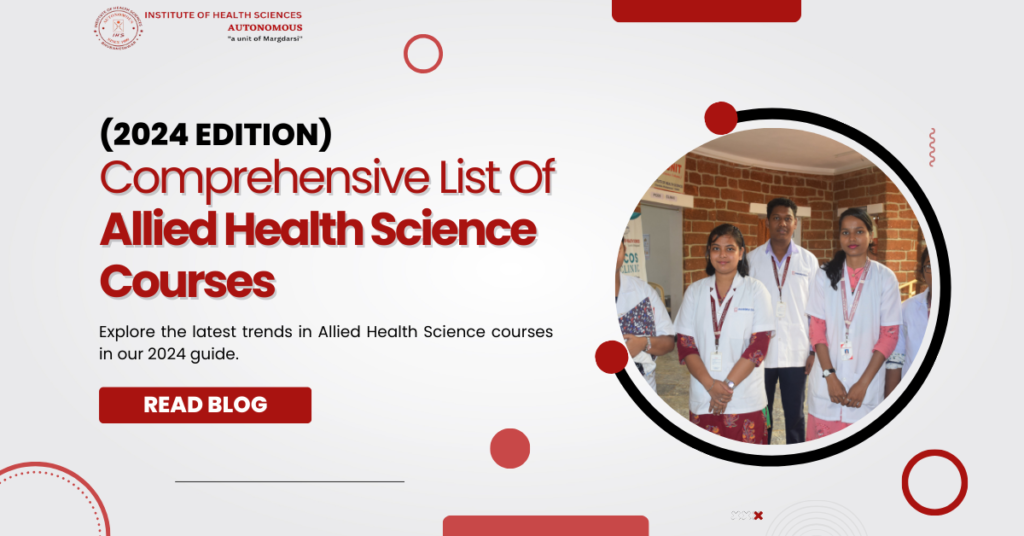In the ever-evolving field of healthcare, allied health professionals play a vital role in patient care and wellness. Allied health science courses provide the gateway to a rewarding and impactful career in the healthcare industry.
This comprehensive guide to the best Allied health science courses in 2024 will help you navigate the diverse options available, enabling you to make an informed decision about your academic and professional journey.
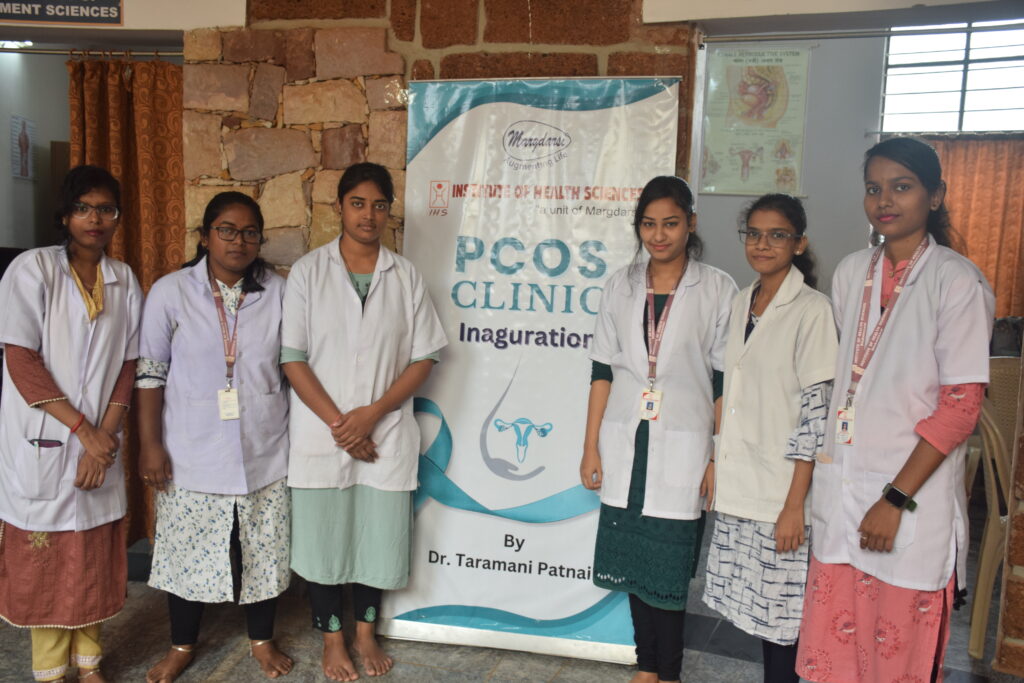
What Are Allied Health Science Courses?
Allied health science courses means encompass a wide range of programs designed to prepare students for careers that support and complement the work of physicians, nurses, and other healthcare professionals.
These courses are highly specialized, focusing on specific areas of healthcare, and provide the skills and knowledge required to excel in these roles.
Read: Medical Courses List without NEET
Why Choose a Career in Allied Health Sciences?
The healthcare industry is constantly expanding, creating a growing demand for qualified Allied health professionals.
By choosing a career in Allied health sciences, you not only gain job security but also the satisfaction of making a significant impact on patient outcomes and well-being.
Whether you aspire to work in diagnostic imaging, rehabilitation therapy, or patient care, there’s a niche for you within the Allied health field.
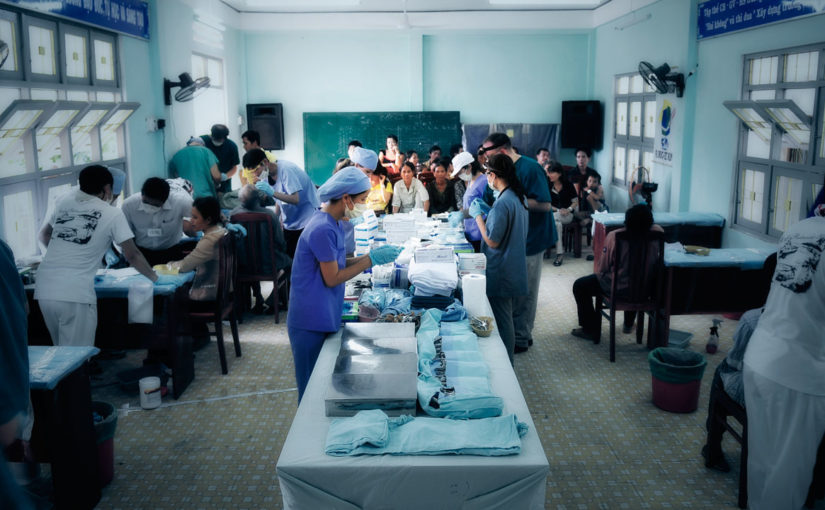
Read: Best Paramedical Courses with High Salary Without NEET
Telegram Group for Allied Health Sciences
📚 Join IHS FREE Telegram Group for Allied Health Sciences! Discover educational content, guides, how-tos, and checklists for courses in India. Gain valuable insights today! 👉 Join here: https://t.me/+5lIxr-bwfV0wZTY1
Key Specializations in Allied Health Science Courses (Allied Science Courses List)
Here are some of the top Best Allied health science courses you can consider:
- Bachelor’s Degree in Optometry: This Allied health science courses in india trains students to become optometrists, who are healthcare professionals specializing in eye care. With an increasing number of people suffering from vision-related issues, optometrists are in high demand to provide eye examinations, prescribe corrective lenses, and identify eye diseases.
- Bachelor’s Degree in Occupational Therapy: Occupational therapists help individuals with physical, mental, or developmental conditions regain independence and improve their quality of life. With a growing aging population and awareness of rehabilitation, occupational therapists are needed to provide specialized care.
- Bachelor’s Degree in Prosthetics and Orthotics Engineering: This program focuses on designing and fabricating prosthetic limbs and orthotic devices. As injuries and disabilities are common in India, professionals in this field are essential to improving the mobility and lives of individuals with physical impairments.
- Bachelor’s Degree in Public Health: With the increasing importance of healthcare management and preventive measures, public health professionals play a crucial role in disease control, healthcare policy, and community health education.
- Master’s Degree in Psychiatric Social Work: Mental health awareness is on the rise in India, leading to a demand for psychiatric social workers who provide support, counseling, and therapy to individuals dealing with mental health issues.
- Master’s Degree in Medical Social Work: Medical social workers work in healthcare settings, helping patients and their families cope with medical diagnoses, treatment plans, and emotional challenges, making them essential in the healthcare system.
- Bachelor’s Degree in Medical Lab Technology: Medical laboratory technologists after doing BMLT Course are responsible for conducting diagnostic tests and analyzing samples. Their role is vital in disease diagnosis and patient care.
- Master’s Degree in Public Health: Public health experts after completing Public health course focus on preventing diseases, promoting healthy behaviors, and improving healthcare systems, which are critical aspects of India’s healthcare landscape.
- Master’s Degree in Clinical Psychology: As mental health awareness grows, clinical psychologists are in high demand to provide counseling and therapy to individuals dealing with various psychological issues.
- Master’s Degree in Hospital Administration: With an expanding healthcare industry, hospital administrators are needed to manage healthcare facilities efficiently and ensure quality patient care.
- MPT Neurology: Given the prevalence of neurological disorders, such as stroke and multiple sclerosis, MPT Neurology specialists are required for rehabilitation and improving the quality of life for patients.
- MPT Pediatrics: Specializing in pediatric physical therapy, MPT Pediatrics professionals work with children with developmental delays and disabilities, addressing a critical need in child healthcare.
- MPT Cardio Pulmonary Therapy: With the rise in cardiovascular and respiratory diseases, these therapists help patients recover from heart and lung-related issues, enhancing their demand.
- MPT Geriatrics: The aging population requires specialized care, making MPT Geriatrics specialists valuable for addressing the unique healthcare needs of older adults.
- MPT Gynecology: Women’s health is a significant focus in India, with a growing demand for MPT Gynecology professionals who provide rehabilitation and support in this field.
- MA in Yoga: As yoga gains global recognition for its health benefits, there’s a surge in demand for qualified yoga instructors and therapists.
- Ed in Autism Spectrum Disorders: With the increasing awareness of autism, trained educators specializing in autism spectrum disorders are needed to provide inclusive education and support.
- Master in Rehabilitation Sciences: Rehabilitation experts work with patients with various disabilities, and their services are integral to enhancing the quality of life for these individuals.
- MPT Orthopedics: Musculoskeletal conditions and injuries are common, driving the demand for MPT Orthopedics specialists who focus on physical rehabilitation.
Don’t Miss Out on Free Counseling for Allied Health Sciences – Call Us at 9040009046
How to Choose the Right Allied Health Science Course?
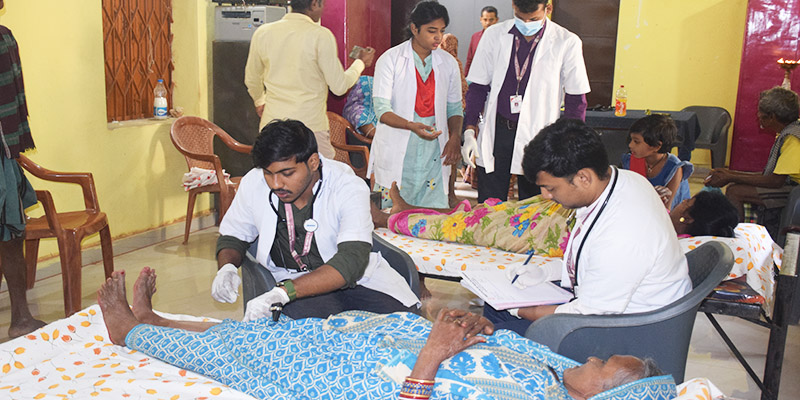
Selecting the right Allied health science course is a crucial decision that should align with your interests and career goals.
Consider factors such as specialization, program duration, accreditation, and job prospects when making your choice.
Additionally, explore the admission requirements for each program to ensure you meet the criteria.
- Research different specializations.There are many different specializations in Allied health sciences, so it’s important to choose one that aligns with your interests and skills.
- Consider your career goals.What do you want to achieve in your career? Some allied health professions offer more advancement opportunities than others.
- Think about your lifestyle needs.How much time do you have to commit to your studies? Some allied health science programs are full-time, while others are part-time or online.
- Look into accreditation.Accreditation ensures that a program meets certain quality standards. Make sure the program you choose is accredited by a recognized organization.
- Research job prospects.How are the job prospects for the allied health profession you’re interested in? You can research job prospects by looking at government websites, industry reports, and job postings.
Ready to Shape Your Future in Allied Health Sciences? Call for Free Counseling! Call Us at 9040009046
Conclusion
The world of allied health science courses is dynamic and full of opportunities.
As the healthcare industry continues to grow, so does the demand for skilled professionals who can contribute to patient care and recovery.
By pursuing a career in allied health sciences, you embark on a path of personal fulfillment and the chance to make a meaningful impact on the lives of others.
Whether you aspire to become a radiologic technologist, physical therapist, respiratory therapist, occupational therapist, or speech-language pathologist, the right allied health science course can set you on the path to success. Take the time to explore your options, and soon you’ll be on your way to a rewarding healthcare career.
In this comprehensive guide to allied health science courses (2024 edition), we’ve highlighted the key aspects of these programs, providing you with valuable insights to help you make an informed decision about your future.
Choose a course that aligns with your passion and embark on a journey towards a fulfilling career in healthcare.
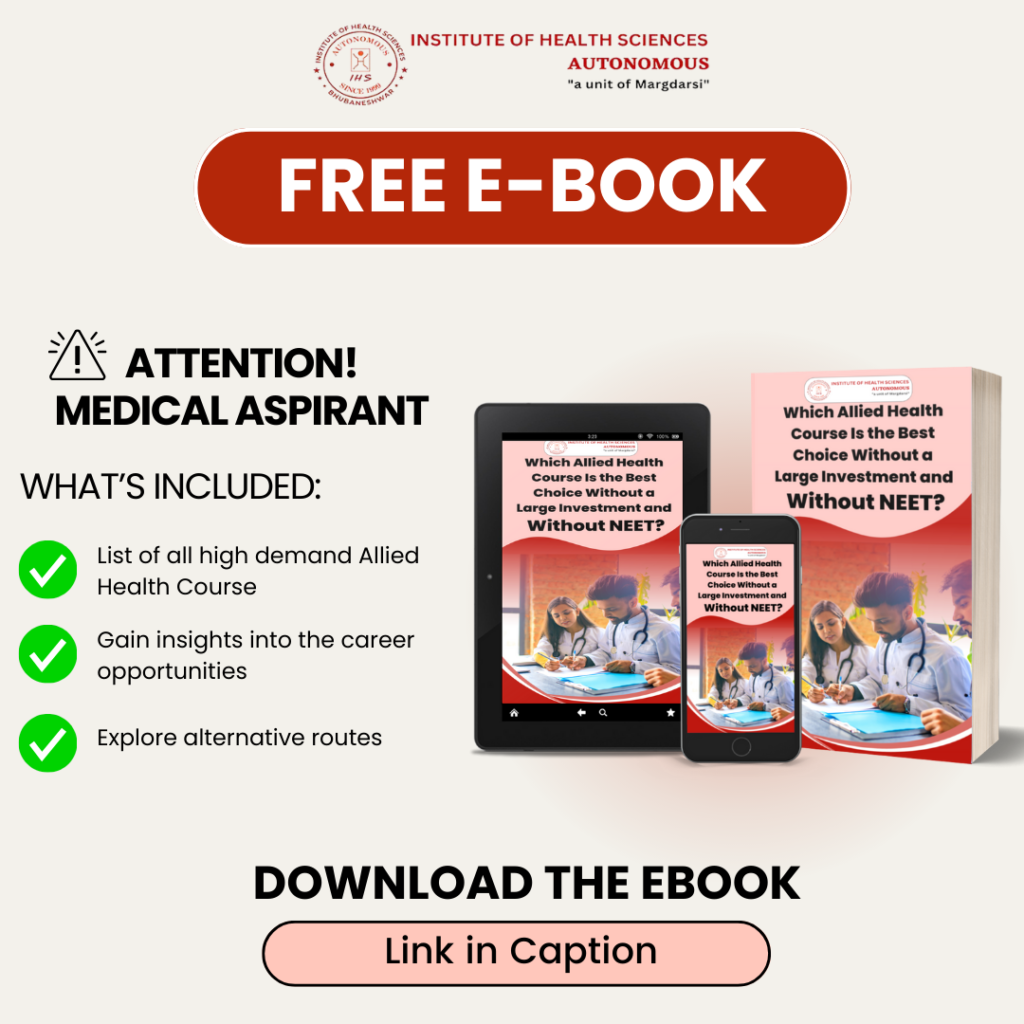
Get this FREE eBook: https://forms.gle/8mQSB9u9s4GP42iq7
Frequently Asked Question: Allied Health Science Courses
Which allied health science course is considered the best?
There is no single “best” allied health science course, as the best course for you will depend on your interests, skills, and career goals. However, some of the most popular and in-demand allied health science courses include:
- Medical laboratory technology
- Radiography
- Operation theatre technology
- Optometry
- Nutrition and dietetics
- Physiotherapy
- Occupational therapy
- Speech-language pathology
- Audiology
- Dental hygiene
- Physician assistant
What does an allied health course entail?
Allied health science courses typically involve a mix of classroom instruction, laboratory work, and clinical rotations. In the classroom, students will learn about the human body, disease processes, and diagnostic and therapeutic procedures. In the laboratory, students will learn how to perform various tests and procedures. And during clinical rotations, students will gain hands-on experience working with patients under the supervision of qualified professionals.
What career prospects exist within allied health sciences?
Allied health science professionals play a vital role in the healthcare system. They work in a variety of settings, including hospitals, clinics, schools, and private practices. Allied health science professionals may be involved in providing direct patient care, conducting research, or developing and managing healthcare programs. The job outlook for allied health science professionals is generally very good. The US Bureau of Labor Statistics projects that employment of allied health science occupations will grow 20% from 2020 to 2030, much faster than the average for all occupations. This growth is being driven by an aging population and increasing demand for healthcare services.
Which allied health course offers the highest salary potential?
The salary potential for allied health science professionals varies depending on the specific occupation, experience level, and location. However, some of the highest-paying allied health science occupations include:
- Physician assistant
- Nurse anesthetist
- Clinical perfusionist
- Dental hygienist
- Medical laboratory scientist
- Radiographer
What is the average salary for BSc allied health science graduates in India?
The average salary for BSc allied health science graduates in India varies depending on the specific occupation, experience level, and location. However, according to Payscale, the average salary for BSc allied health science graduates in India is ₹3.5 lakhs per annum.
What is the earning potential for allied health science professionals in India?
The earning potential for allied health science professionals in India is very good. With experience, allied health science professionals can earn salaries of ₹5 lakhs per annum or more. Some of the highest-paying allied health science occupations in India include:
- Physician assistant
- Nurse anesthetist
- Clinical perfusionist
- Dental hygienist
- Medical laboratory scientist
- Radiographer
Is BSc Nursing superior to allied health sciences?
BSc Nursing and allied health sciences are both excellent career choices. The best choice for you will depend on your interests, skills, and career goals. BSc Nursing graduates are qualified to provide direct patient care, such as administering medications, monitoring vital signs, and educating patients. Allied health science graduates typically work in more specialized roles, such as performing diagnostic tests, providing therapeutic treatments, and developing and managing healthcare programs.
Is NEET mandatory for pursuing allied health sciences?
NEET is not mandatory for pursuing allied health sciences. However, some allied health science courses, such as B.Sc. in Nursing, may require NEET scores for admission.
Is physiotherapy on par with an MBBS degree?
Physiotherapy is a highly respected and in-demand profession. However, it is not on par with an MBBS degree in terms of salary and prestige. MBBS graduates are qualified to practice medicine, while physiotherapists are not.
What sets apart paramedical from allied health sciences?
Allied health sciences is a broad term that encompasses a wide range of healthcare professions. Paramedical is a narrower term that typically refers to professions that provide direct patient care, such as nursing, physiotherapy, and occupational therapy.
Is paramedical a preferable choice over nursing?
Paramedical and nursing are both excellent career choices. The best choice for you will depend on your interests.
